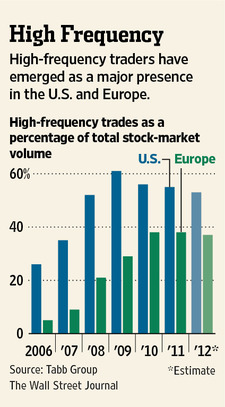Pete Kovac, a friend who worked for a quantitative trading firm, got in touch with me soon after Michael Lewis’s Flash Boys came out last Spring to let me know he thought the book had serious errors.
My friend became so alarmed at the Michael Lewis version of quant trading – which appears to have been quickly adopted by regulators and politicians – that he set out to write a response and correction to the flawed Lewis narrative.
What’s so interesting about Kovac’s response is that quant traders have generally shunned describing publically how they make money. As a result, they are at a huge disadvantage in telling the quantitative trading version of things when competing with a writer like Lewis. Yet, one of the weaknesses of Lewis’ book is that he appears to have had very little access to quant traders themselves. So how does a quant get his version of the truth out?
Kovac releases his book this week, and I’ve included an excerpt below.
To set up the excerpt – and for those who haven’t read Flash Boys yet – here’s a quick primer.
The premise of Flash Boys (reviewed here) is that a new set of quantitative (or algorithmic) firms emerged in the past decade that engage in an unfair technology race that allows them to front-run other investors. According to Lewis, the quant firms use a combination of:
- Paying exchanges for trading order flow to gain information milliseconds before other traders.
- Locating trading machines physically closer to central exchanges to get millisecond information advantages over other traders.
- Engaging in untraceable trading activity within a broker-sponsored ‘dark pool’ exchange to front-run slower traders.
- Sending rapid-fire trade inquiries and cancellations to exchanges or dark pools to manipulate market liquidity.
In addition, Lewis describes a plunky band of misfits led by Brad Katsuyama who cobble together an alternative stock exchange – The IEX – using old newspapers, string, and wadded up chewing gum to launch a better, fairer, slower exchange to keep out the quant trading baddies.
Kovac wrote his critique – excerpted below – to correct what he sees as the biggest errors of Lewis’ book.
Excerpt of Kovac’s Flash Boys Critique
I’ll link to the full book, available on Amazon, as soon as it gets posted.
Please see related book reviews:
Inside the Black Box, by Rishi Narang
Please also see related posts:
The Katsuyama Revolution Continues
Post read (2451) times.








One Reply to “Excerpt From Critique of Michael Lewis’ Flash Boys”
I wonder how would the market work if everyone used only market orders or limit orders that are kept on their own computer. It could result in firms with ability to trade at low cost making small trades/wash trades at arbitrary prices in order to discover what price would be “right” for the other participants. Why? If those firms knew where the other people were intersted in buying and selling, this would allow the firms to offer a tighter spread or “better price”, to those with inside information or latency advantage to news event. No one else beside these insiders and time advantaged would benefit, especially given the faster participants would remove their lower spread quoted to get out of the way faster if some rate change/QE event would happen.
If there is a real negative effect to HFT (or any lower timeframe participant – effectively: more efficient competition), the question to ask is: What effects in long term does more participants playing inside your (longer term player) spread have on your ability to make money?
The effects are atleast of:
dampened volatility (lower turnover), less opportunities to get executed, less profit, need to use higher spread than those advantaged with latency or lower trade costs.
The only way to make money is buy low and sell high, unless, with dividend proceeds and similar being exception. So effectively everyone is a market maker. More market makers with lower spreads = less trade executions for the higher time frame market makers.
In practise computerize finance has replaced the intra-day specialists and allowed more participants try hand at intraday games.
The real question is: How is the market different incase of sudden value shifting event now vs the old days with specialists and such.
There are key couple differences but since some are positive and some negative, it’s possible the effects cancel out.
I suspect the biggest market effecting changes since the old days is less “dumb money”, more “smart money” and easier to use insurance/options related products. The effect of these to lower volatility over past few years may have been bigger than the changes in intra-day market making.